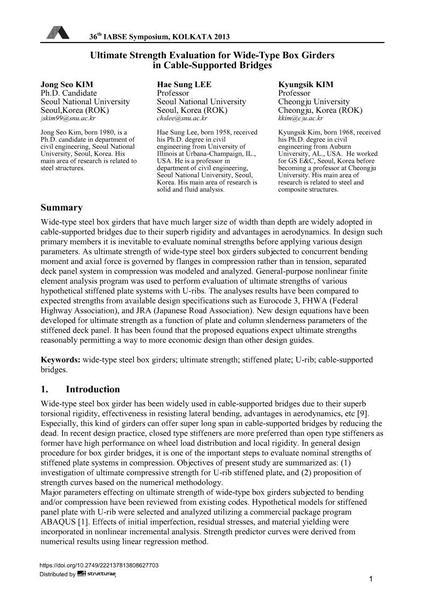Ultimate Strength Evaluation for Wide-Type Box Girders in Cable-Supported Bridges

|
|
|||||||||||
Détails bibliographiques
| Auteur(s): |
Jong Seo Kim
Hae Sung Lee Kyungsik Kim |
||||
|---|---|---|---|---|---|
| Médium: | papier de conférence | ||||
| Langue(s): | anglais | ||||
| Conférence: | IABSE Symposium: Long Span Bridges and Roofs - Development, Design and Implementation, Kolkata, India, 24-27 September 2013 | ||||
| Publié dans: | IABSE Symposium Kolkata 2013 | ||||
|
|||||
| Page(s): | 1-8 | ||||
| Nombre total de pages (du PDF): | 8 | ||||
| Année: | 2013 | ||||
| DOI: | 10.2749/222137813808627703 | ||||
| Abstrait: |
Wide-type steel box girders that have much larger size of width than depth are widely adopted in cable-supported bridges due to their superb rigidity and advantages in aerodynamics. In design such primary members it is inevitable to evaluate nominal strengths before applying various design parameters. As ultimate strength of wide-type steel box girders subjected to concurrent bending moment and axial force is governed by flanges in compression rather than in tension, separated deck panel system in compression was modeled and analyzed. General-purpose nonlinear finite element analysis program was used to perform evaluation of ultimate strengths of various hypothetical stiffened plate systems with U-ribs. The analyses results have been compared to expected strengths from available design specifications such as Eurocode 3, FHWA (Federal Highway Association), and JRA (Japanese Road Association). New design equations have been developed for ultimate strength as a function of plate and column slenderness parameters of the stiffened deck panel. It has been found that the proposed equations expect ultimate strengths reasonably permitting a way to more economic design than other design guides. |
||||
